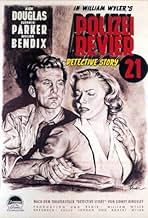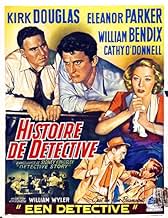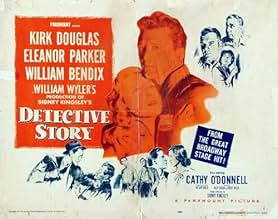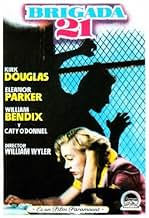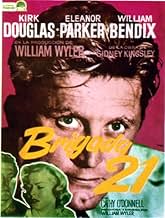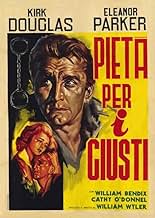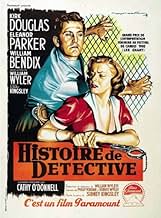Un día en la sala del escuadrón del Precinto 21, con una variedad de personajes causando problemas al detective Jim McLeod.Un día en la sala del escuadrón del Precinto 21, con una variedad de personajes causando problemas al detective Jim McLeod.Un día en la sala del escuadrón del Precinto 21, con una variedad de personajes causando problemas al detective Jim McLeod.
- Dirección
- Guión
- Reparto principal
- Nominado para 4 premios Óscar
- 7 premios y 11 nominaciones en total
William 'Bill' Phillips
- Det. Pat Callahan
- (as William 'Bill' Phillips)
Reseñas destacadas
This top-notch police story rises far above the norm for its type. A true example of ensemble acting, the film incorporates many well-known character actors all putting in first-rate work, led by the superb efforts of Kirk Douglas and William Bendix, the latter in what may be his best screen role. This may be one of the earliest examples of the "typical day" genre, in which multiple story lines occurring in a single day in a certain locale are melded into a whole (a genre exemplified by the "Hill Street Blues" and "Barney Miller" of tv). An excellent script and good direction, aided by interesting characters, keep the dramatic tension moving along briskly to the searing conclusion. This is not your run-of-the-mill police story, and is definitely worth a see.
In one day in the 21st Precinct of New York, many criminals are booked after being arrested: a shoplifter is brought after stealing a purse in a department store; two burglars with extensive criminal record are captured by a policeman burgling an apartment; the small time embezzler Arthur Kindred (Craig Hill), who is primary, is arrested without any resistance. The tough Detective McLeod (Kirk Douglas), who loves his wife Mary (Eleanor Parker), is an honest detective with strong principles and code of honor and zero tolerance. He is near to conclude a case against an abortionist, Dr. Karl Schneider (George Macready), with the testimony of a witness that is coming to identify Dr. Schneider in the precinct. However, the woman is bribed and the upset McLeod hits Schneider, and he insinuates to McLeod's chief, Lt. Monaghan (Horace McMahon), that the problem is personal and gives the name of Mary McLeod. Lt. Monaghan invites Mary to come to his office for investigation, when deep innermost secrets of her past are disclosed leading to a tragedy.
"Detective Story" is amazingly intense and full of emotions in spite of being shot practically in only one scenario in the interior of the precinct. Kirk Douglas gives an outstanding performance, developing a complex character that sees his principles destroyed in a couple of hours with a great intensity. Eleanor Parker is also fantastic, in the dramatic and heartbreaking role of Mary McLeod. The direction of William Wyler is perfect as usual. My vote is eight.
Title (Brazil): "Chaga de Fogo" ("Sore of Fire")
"Detective Story" is amazingly intense and full of emotions in spite of being shot practically in only one scenario in the interior of the precinct. Kirk Douglas gives an outstanding performance, developing a complex character that sees his principles destroyed in a couple of hours with a great intensity. Eleanor Parker is also fantastic, in the dramatic and heartbreaking role of Mary McLeod. The direction of William Wyler is perfect as usual. My vote is eight.
Title (Brazil): "Chaga de Fogo" ("Sore of Fire")
Detective Story (1951)
**** (out of 4)
William Wyler's brilliant drama about a police detective (Kirk Douglas) who breaks his back trying to put criminals behind bars but there's a secret from his wife that's going to toss all his beliefs in the air. The last time I watched this film was when I was around eleven years old and it left a vivid aftertaste in my mouth after all these years. At the time I was just expecting another "old, dated" film but the realistic nature of this film remains quite powerful and very brutal even in today's jaded world. The entire cast delivers strong performances from the lead Douglas to the smallest of parts in the film. These performances certainly help the film seem all the more real, which is an added bonus. The best performance is of course the one by Douglas who brings all that energy and power to the film. Watching his character slowly breakdown and eventually lose it is something hard to forget.
**** (out of 4)
William Wyler's brilliant drama about a police detective (Kirk Douglas) who breaks his back trying to put criminals behind bars but there's a secret from his wife that's going to toss all his beliefs in the air. The last time I watched this film was when I was around eleven years old and it left a vivid aftertaste in my mouth after all these years. At the time I was just expecting another "old, dated" film but the realistic nature of this film remains quite powerful and very brutal even in today's jaded world. The entire cast delivers strong performances from the lead Douglas to the smallest of parts in the film. These performances certainly help the film seem all the more real, which is an added bonus. The best performance is of course the one by Douglas who brings all that energy and power to the film. Watching his character slowly breakdown and eventually lose it is something hard to forget.
Kirk Douglas has always excelled in roles where he plays the maverick loner, walking the fine line between anger and insanity. Thus his role as Det. Jim McLeod in "Detective Story" is a real showcase for his acting talents. This is not a crime drama in the conventional sense where there is any real action or crime to solve, even though you have a room full of New York City police detectives on screen for just about the whole movie. Instead it is a character study of Jim McLeod, played by Kirk Douglas. McLeod's motivation in his work is not to solve crimes or even protect the innocent. Instead, he is motivated by a desire to root out evil by his definition of the word. Evil is something McLeod claims that anyone can easily spot. McLeod's world view doesn't differentiate between the one-time bad act of a basically good person, such as Arthur Kindred (Craig Hill), a young man who impulsively stole from his employer in a last ditch attempt to impress a girl he believed he loved, versus the misdeeds of a lifetime criminal, such as the homicidal maniac Charlie (Arthur Kindred), that has also been apprehended by the detective squad that same day.
When confronted by a mistake in the past of the person nearest to him, his own wife, McLeod is equally unforgiving. His rage and disgust is so great, you're not sure what bothers him more - the discovery of his wife's past or the failure of his own nose to sniff out the misdeed prior to this. By the time McLeod realizes his own inflexibility and lack of empathy have cost him what he loves the most, it is too late to undo the damage, and this leads to one last tragedy.
This is Douglas in an early fine if not huggable role, and is recommended viewing for that reason alone. William Bendix makes up for the lack of likability in Douglas' character as Detective Lou Brady, who likes to temper the letter of the law with a little humanity. Then there's a very young Lee Grant as a shoplifter who just can't stop babbling. Finally, there's Horace McMahon as Lieutenant Monaghan, head of the detective squad and the kind of boss we'd all like to have.
When confronted by a mistake in the past of the person nearest to him, his own wife, McLeod is equally unforgiving. His rage and disgust is so great, you're not sure what bothers him more - the discovery of his wife's past or the failure of his own nose to sniff out the misdeed prior to this. By the time McLeod realizes his own inflexibility and lack of empathy have cost him what he loves the most, it is too late to undo the damage, and this leads to one last tragedy.
This is Douglas in an early fine if not huggable role, and is recommended viewing for that reason alone. William Bendix makes up for the lack of likability in Douglas' character as Detective Lou Brady, who likes to temper the letter of the law with a little humanity. Then there's a very young Lee Grant as a shoplifter who just can't stop babbling. Finally, there's Horace McMahon as Lieutenant Monaghan, head of the detective squad and the kind of boss we'd all like to have.
A play which tells the story of a day in the lives of the several people who populate a police precinct translates more or less transparently between mediums, though with its theatrical pace results in a vigorous, enthralling drama with a solid, receptive cast. Kirk Douglas, playing the central cop, a brooding maverick who can't stand having to stop at the line between law and vengeance, is very intense in particular, the breadth of view of a crystallizing soul masqueraded by rigor and command, which makes for some delicate scenes with his wife, Eleanor Parker. The very natural William Bendix is one of the other officers in the precinct, a cop with a delicate sensibility, the clear contrast to the uncompromising protagonist. But the film's brightest highlights are the few moments dominated by the brilliant Lee Grant, whose character seems non-sequitary yet has a refreshing outside-world quality. Dense with lively exhibitions of the sort of devil-may-care influx that transits and languishes through a workday of plainclothes detectives, it is a police procedural not in the traditional sense. There is no central case over which our detectives toil. There is simply an allotment of arrests and conflicting views on the confines of police work.
While this Edgar-winning cop drama stays in effect a filmed play, William Wyler uses the innate limitations of such a project as a creative outlet, as well as his widely known grating approach multiple retakes. The cooped up setting is not just a space where all manner of characters eyeball each other and interplay. It complements the lurking gist of the story's thematic elements and overall to the film's dramatic impact. The staging of the individual scenes, which a lot of the time plays on foreground-background relationships, is intensified by Lee Garmes's deep-focus cinematography, a consistent device used by Wyler throughout his body of work no matter how much he diversifies in genre and tone.
The core of Wyler's consistency throughout his tremendous career is his insistence on emotional truth, thus his enraging approach to directing actors, and thus his track record with directing Oscar-nominated and Oscar-winning performances. Wyler's discretion of angle exposes or intimates more character than the last and apprehends the decisive sensibility to give significance to the experience of seeing the film. He didn't coin anything new. He didn't use unprecedented angles or logistically fussy dolly takes. He's discerning from the acknowledged bill of fare of long shot, medium shot and close-up as the atmosphere of the scene calls for.
While this Edgar-winning cop drama stays in effect a filmed play, William Wyler uses the innate limitations of such a project as a creative outlet, as well as his widely known grating approach multiple retakes. The cooped up setting is not just a space where all manner of characters eyeball each other and interplay. It complements the lurking gist of the story's thematic elements and overall to the film's dramatic impact. The staging of the individual scenes, which a lot of the time plays on foreground-background relationships, is intensified by Lee Garmes's deep-focus cinematography, a consistent device used by Wyler throughout his body of work no matter how much he diversifies in genre and tone.
The core of Wyler's consistency throughout his tremendous career is his insistence on emotional truth, thus his enraging approach to directing actors, and thus his track record with directing Oscar-nominated and Oscar-winning performances. Wyler's discretion of angle exposes or intimates more character than the last and apprehends the decisive sensibility to give significance to the experience of seeing the film. He didn't coin anything new. He didn't use unprecedented angles or logistically fussy dolly takes. He's discerning from the acknowledged bill of fare of long shot, medium shot and close-up as the atmosphere of the scene calls for.
¿Sabías que...?
- CuriosidadesFilm debut of Lee Grant who was nominated for an Oscar, before being blacklisted for refusing to testify against then-husband Arnold Manoff.
- PifiasIn some of the close-up shots of McLeod and Schneider in the back of the paddy wagon, McLeod's shadow can be faintly seen on the rear-projection screen showing the street behind them. (Other shadows can also be seen.)
- Citas
Detective James McLeod: I built my whole life on hating my father. All the time he was inside me, laughing.
- ConexionesFeatured in Paramount Presents (1974)
Selecciones populares
Inicia sesión para calificar y añadir a tu lista para recibir recomendaciones personalizadas
- How long is Detective Story?Con tecnología de Alexa
Detalles
- Fecha de lanzamiento
- País de origen
- Idioma
- Títulos en diferentes países
- La història d'un detectiu
- Localizaciones del rodaje
- Empresa productora
- Ver más compañías en los créditos en IMDbPro
- Duración
- 1h 43min(103 min)
- Color
- Relación de aspecto
- 1.37 : 1
Contribuir a esta página
Sugerir un cambio o añadir el contenido que falta


